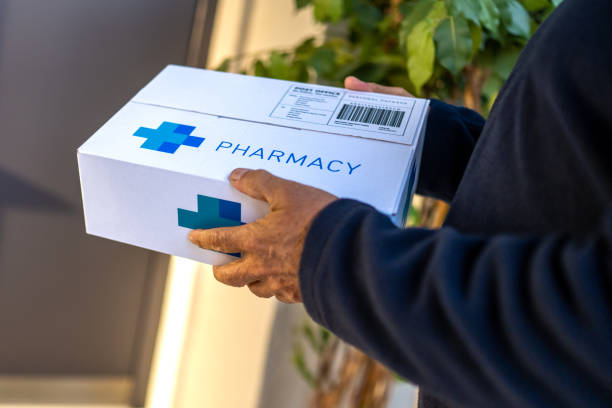- January 6, 2025
- Technology
From Dispatch to Delivery: The Role of Social Media in Modern Medical Courier Solutions

Table of Contents
ToggleMedical courier services are an integral part of healthcare logistics, responsible for transporting sensitive materials such as laboratory samples, pharmaceuticals and medical devices. These deliveries are often time-sensitive, requiring precision and real-time coordination to protect patient safety and comply with regulatory standards. In this high-stakes framework, the integration of social media platforms has emerged as a transformative force, streamlining communication and advancing operational efficiency.
The Best Medical Courier Apps
A variety of apps are available that cater specifically to the needs of medical courier services, blending advanced logistics features with user-friendly interfaces. Apps like Circuit and Onfleet provide real-time tracking, automated route optimization and compliance with healthcare delivery standards. These applications integrate seamlessly with social media platforms to enhance communication, enabling couriers to stay updated on traffic, weather and client requirements. Meanwhile, features like barcode scanning and electronic proof of delivery provide greater accuracy and streamline workflows, indispensable for modern medical logistics.
Enhancing Real-Time Communication
Social media platforms offer a direct channel for instant communication among courier teams, dispatch centers and healthcare clients. Platforms such as WhatsApp and Slack have become indispensable tools for real-time updates, allowing dispatchers to relay critical information about route changes, traffic disruptions or weather conditions. This instantaneous exchange reduces delays, promotes transparency and supports a collaborative framework critical for maintaining service quality in medical logistics. Thus, consolidating messages in one platform further reduces miscommunication and streamlines interactions.
Optimizing Route Planning and Traffic Management
Route optimization is a cornerstone of effective courier operations. Thus, social media applications are central in disseminating live traffic updates and road closure information; tools like Waze, which integrate crowdsourced data, allow couriers to make informed decisions, minimizing transit times and facilitating prompt delivery. Furthermore, social media forums and local traffic groups can serve as additional sources of hyper-local insights, enabling dispatchers to adapt strategies dynamically. Integrating these insights into advanced logistics software further refines operational planning.
Building Client Trust and Transparency
In an industry where trust is paramount, social media supports transparency by enabling real-time tracking and communication with clients. Many medical courier companies now use platforms to provide status updates and estimated delivery times, creating an open line of communication. This proactive approach to customer service strengthens client confidence and helps establish credibility, which is essential in handling critical medical deliveries. Frequent and clear updates about delivery stages can reduce client anxiety in high-pressure situations.
Streamlining Incident Reporting and Resolution
Medical courier operations often encounter challenges such as equipment malfunctions or unexpected delays. Social media platforms facilitate swift incident reporting and resolution by allowing couriers to communicate issues to dispatchers and managers in real time. Photographic evidence or live updates can be shared instantly, enabling faster decision-making and reducing potential disruptions to the delivery schedule. This capability is particularly vital in managing temperature-sensitive shipments or other specialized medical items. Timely resolution of these issues prevents cascading delays in interconnected logistics systems.
Leveraging Data for Predictive Analytics
Social media’s role extends beyond communication to data analytics. Insights derived from social media interactions can inform predictive models for demand forecasting, allowing courier companies to allocate resources effectively; for instance, tracking social media mentions of flu outbreaks or regional health trends can help anticipate surges in demand for medical supplies. This proactive approach bolsters readiness and mitigates potential supply chain bottlenecks. Leveraging this data in conjunction with machine learning tools offers even greater precision in forecasting trends.
Strengthening Workforce Collaboration
Effective collaboration among courier teams and dispatchers is critical for seamless operations. Social media platforms support team cohesion by enabling group communication and information sharing – platforms such as Microsoft Teams or proprietary apps allow for centralized updates, keeping all stakeholders aligned. This collaborative framework improves efficiency and minimizes errors, which are especially consequential in medical logistics. Encouraging regular team check-ins through these platforms enhances accountability and strengthens professional relationships.
Enhancing Training and Development
The dynamic nature of medical courier services necessitates ongoing training and adaptation. Social media platforms can be leveraged for virtual training sessions, sharing best practices and disseminating updates on regulations or protocols. Video conferencing tools and social media groups serve as cost-effective platforms for knowledge exchange, equipping couriers with the skills and information needed to handle complex deliveries. Moreover, interactive features on these platforms facilitate deeper engagement with training content.
Boosting Public Awareness and Branding
Social media also serves as a powerful tool for building brand visibility and public awareness. Medical courier companies use platforms like LinkedIn, Twitter and Instagram to highlight their services, share success stories and educate the public about their role in healthcare. This strategic use of social media enhances the company’s reputation, attracts potential clients and supports community engagement. Meanwhile, highlighting testimonials and real-time successes on these platforms can amplify brand credibility.
Mitigating Risk Through Monitoring
The monitoring capabilities of social media platforms offer a way to identify potential risks in real time. Staying informed about local events, protests or natural disasters through platforms like Twitter allows courier companies to proactively adjust routes and schedules to avoid disruptions. This approach bolsters operational resilience and supports the continuity of critical medical deliveries while incorporating predictive analytics into risk assessment further enhances these monitoring efforts.
Driving Innovation in Courier Technology
Social media’s influence extends to the development and adoption of innovative courier technologies. Platforms serve as spaces for industry professionals to discuss emerging trends, such as drone deliveries or autonomous vehicles. Insights gleaned from these discussions inform technological advancements, driving the evolution of medical courier solutions. Meanwhile, the integration of social media with Internet of Things (IoT) devices further amplifies this synergy, enabling smarter and more responsive logistics networks. Ultimately, collaborative industry discussions on these platforms often accelerate the adoption of disruptive technologies in 2025.
Share it with your friends!
Explore
More
Ready to get started?
Harness the unmatched capabilities of ActionSprout to transform your Facebook strategy. Elevate engagement, captivate your audience, and achieve unparalleled results. Don’t wait – seize the opportunity.

